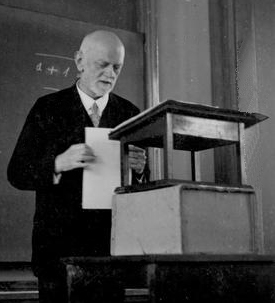- About MAA
- Membership
- MAA Publications
- Periodicals
- Blogs
- MAA Book Series
- MAA Press (an imprint of the AMS)
- MAA Notes
- MAA Reviews
- Mathematical Communication
- Information for Libraries
- Author Resources
- Advertise with MAA
- Meetings
- Competitions
- Programs
- Communities
- MAA Sections
- SIGMAA
- MAA Connect
- Students
- MAA Awards
- Awards Booklets
- Writing Awards
- Teaching Awards
- Service Awards
- Research Awards
- Lecture Awards
- Putnam Competition Individual and Team Winners
- D. E. Shaw Group AMC 8 Awards & Certificates
- Maryam Mirzakhani AMC 10 A Awards & Certificates
- Two Sigma AMC 10 B Awards & Certificates
- Jane Street AMC 12 A Awards & Certificates
- Akamai AMC 12 B Awards & Certificates
- High School Teachers
- News
You are here
David Hilbert's Radio Address - English Translation
Listen to David Hilbert's 1930 radio address in German (4 minutes) while reading along in English. A side-by-side German transcription and English translation are on the next page.
The instrument that mediates between theory and practice, between thought and observation, is mathematics; it builds the connecting bridge and makes it stronger and stronger. Thus it happens that our entire present-day culture, insofar as it rests on intellectual insight into and harnessing of nature, is founded on mathematics. Already, GALILEO said: Only he can understand nature who has learned the language and signs by which it speaks to us; but this language is mathematics and its signs are mathematical figures. KANT declared, “I maintain that in each particular natural science there is only as much true science as there is mathematics.” In fact, we do not master a theory in natural science until we have extracted its mathematical kernel and laid it completely bare. Without mathematics today’s astronomy and physics would be impossible; in their theoretical parts, these sciences unfold directly into mathematics. These, like numerous other applications, give mathematics whatever authority it enjoys with the general public.
Nevertheless, all mathematicians have refused to let applications serve as the standard of value for mathematics. GAUSS spoke of the magical attraction that made number theory the favorite science for the first mathematicians, not to mention its inexhaustible richness, in which it so far surpasses all other parts of mathematics. KRONECKER compared number theorists with the Lotus Eaters, who, once they had sampled that delicacy, could never do without it.

David Hilbert in 1932
(Courtesy of the Archives of the Mathematisches
Forschungsinstitut Oberwolfach)
With astonishing sharpness, the great mathematician POINCARÉ once attacked TOLSTOY, who had suggested that pursuing “science for science’s sake” is foolish. The achievements of industry, for example, would never have seen the light of day had the practical-minded existed alone and had not these advances been pursued by disinterested fools.
The glory of the human spirit, so said the famous Königsberg mathematician JACOBI, is the single purpose of all science.
We must not believe those, who today with philosophical bearing and a tone of superiority prophesy the downfall of culture and accept the ignorabimus. For us there is no ignorabimus, and in my opinion even none whatever in natural science. In place of the foolish ignorabimus let stand our slogan:
We must know,
We will know.
James T. Smith (San Francisco State University), "David Hilbert's Radio Address - English Translation," Convergence (February 2014)




